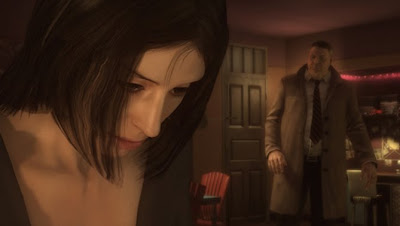Where Does the Road Not Taken Lead?

In Robert Frost's famous poem "The Road Not Taken", the narrator walks through the woods and encounters a fork in the road. The fork is a metaphor for an important life decision. Once the decision is made, the path is chosen and the narrator will not be able to return and explore the other route. Near the end of the poem the narrator speaks of a sigh—presumably an expression of regret at his choice. A key observation is that the narrator would not feel regret unless he truly believed that he would have reached a different outcome had he chosen the other path.
Heavy Rain, the latest game from developer Quantic Dream, bills itself as an interactive drama, and that is an apt description. The player takes the role of four different characters in an attempt to prevent a serial killer from claiming the next victim. In the vast majority of games, player choice is exhibited through spatial movement and physical action—running, jumping, shooting, etc. Heavy Rain, on the other hand, eschews these standard options in favor of letting the player directly affect how the drama develops. This includes how characters react emotionally to various situations as well as the moral choices they make.
As with Frost's traveler, these choices are final and the player must bear the consequences. In theory you could quickly reset the game every time you changed your mind (hoping to beat the auto-save), but that would cheapen the entire experience. Heavy Rain is refreshing in that the player never has to play the same "level" twice. Furthermore, the criteria for winning and losing are often blurred and player-defined. If you make a mistake, then you live with it, learn from it, and move on—just like in real life. Ultimately, Heavy Rain's success as a game depends on whether the player's actions have a meaningful impact on the final outcome, or if they are merely illusions of choice that lead to the same destination regardless of the path taken. The reality lies somewhere in between.
Heavy Rain's style is cinematic film noir and the overall presentation is generally high quality. The visuals are crisp and realistic, with gritty urban settings that range from crowded subway stations and run-down apartment buildings to abandoned warehouses and seedy motels. For the most part the dialogue and voice acting are goo d, and the animations are fluid and believable. The music helps set the mood of each scene quite well.
All of that is necessary to set up the story and draw in the player, but where Heavy Rain sets itself apart as a game is when the narrative creatively gives the player meaningful and consequential choices. Big or small, the results are often personal and rewarding. For example, during a pretend sword fight with my son Jason, my gamer instinct initially led me to start winning the fight. After a couple of times hitting Jason, I thought "You know, this is a kid. I should let him win." Then I intentionally started missing buttons. Jason slashed me in the leg, then he stabbed me in the stomach, and finally my character collapsed to the ground in a fake death. When Jason cheered in victory, I could not help but smile. I loved the inversion of the traditional QTE.
That example is lighthearted, but there is no shortage of intense moral decisions in the game. In one scene, I was resolved to handle an awful moral dilemma in a particular way. Through clever writing, the game threw a sequence of curveballs at me in an attempt to justify backing down from my position. Each new revelation forced me to reconsider my values while under pressure. In the end I steeled myself and continued on the path I had chosen, feeling extremely satisfied that I had resisted temptation. Heavy Rain is at its best during these moments, when the decisions clearly have consequences and the "correct" one is debatable.
In contrast, the game's weakest moments occur when there is no choice. There are some scenes where it is obvious that the player exists simply to propel the action forward through button presses. For instance, there was a scene in which I thought I was being presented with the opportunity to sever a relationship with a particular character, only to discover that was not an option. I was forced to play out the scene, watching two characters reconcile their differences when I would have preferred that they go their separate ways. If I had been allowed to make the choice that I had desired then the outcome of the story would have been far different. In such cases, the game is reduced to a movie and the player’s connection to the story is diminished.
Therein lies the rub with Heavy Rain: The game is structured in such a way that none of the narrative is generated by the program itself. As a result, it requires the developers to explicitly create all the narrative nodes that the player can experience (in this sense it a descendant of “Choose Your Own Adventure” books and games like Dragon's Lair). This is a daunting task because the possibilities are as limitless as there are players. Inevitably, players will encounter some plot holes, hand-waving, and occasions where the characters' behaviors conflict with the manner in which they have been controlled.
Fortunately, in the end I discovered that my actions had a profound effect on the final outcome. All four character threads intertwined to determine not only who lived and who died, but where the characters were headed in the future. Heavy Rain's narrative did not branch quite as much as I would have preferred, but I have not spoken to anyone who has completed the game and had the exact same outcome, so that speaks to the relative uniqueness of my involvement. Accordingly, I found Heavy Rain to be a refreshing, satisfying experience that defies traditional notions of what video games should be. Though I am skeptical that its underlying structure is viable for narratives with larger scope, I hope more developers explore these less traveled roads to see where they might lead.
Rating: 8 out of 10
Disclosures: This game was obtained via retail store and reviewed on the PS3. Approximately 10 hours of play were devoted to the single-player mode (completed 1 time).

